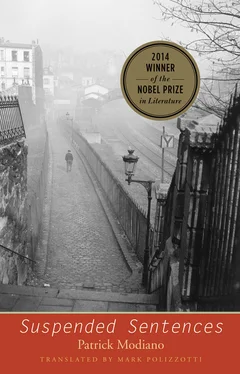“‘Madame’? You can call me Mathilde, blissful idiot.”
Little Hélène, beneath her kindness, must have been tough as nails.
I learned later that she’d met Annie when the latter was nineteen. She wielded such influence over Annie and her mother, Mathilde F., that the two women had gone off with her, abandoning Mr. F.
One day, no doubt, the circus Little Hélène worked in had stopped in the provincial backwater where Annie and her mother lived. Annie had sat near the orchestra, and the trumpets announced the arrival of Little Hélène, who was riding a black stallion with a silver caparison. Or else I imagine her way up high, on the trapeze, getting ready for the perilous triple flip.
And Annie goes to see her after the show, in the trailer that Little Hélène shares with the snake lady.
A friend of Annie F.’s often came to the house. Her name was Frede. Today, from my adult perspective, she’s nothing more than a woman who, in the 1950s, owned a nightclub on Rue Ponthieu. At the time, she seemed to be the same age as Annie, but she was actually a bit older, around thirty-five. A short-haired brunette, with a sylphlike body and pale skin. She wore men’s jackets, cinched at the waist, which I took to be riding jackets.
The other day, at a bookstall, I was leafing through an old back issue of La Semaine à Paris from July 1939, which had the movie, theater, music hall, and cabaret listings. I was surprised to come across a tiny photo of Frede: when she was twenty, she was already master of ceremonies in a nightclub. I bought this program, the way you buy a piece of evidence, some tangible proof that it wasn’t all in your head.
It reads:
THE SILHOUETTE
58, Rue Notre-Dame-de-Lorette
Montmartre, TRI 64-72
FREDE presents
from 10 p.m. til dawn
her all-female Dance-Cabaret
Back from Switzerland
DON MARYO and his famous Orchestra
Guitarist Isidore Langlois
Betty and the Nice Boys
And, fleetingly, I recall the image my brother and I had of Frede whenever we saw her in the garden, as we were returning home from school: a woman who belonged to the world of the circus, like Little Hélène, and whom this world haloed in mystery. We were absolutely certain that Frede operated a circus in Paris, a smaller one than the Médrano, a circus beneath a white canvas big top with red stripes that was called “Carroll’s.” This name was frequently heard in Annie’s and Frede’s mouths: Carroll’s was a nightclub on Rue de Ponthieu, but I imagined the white-and-red big top and the circus animals, of which Frede, with her svelte silhouette and cinched jackets, was the tamer.
Sometimes on Thursdays, when we didn’t have school, she brought her nephew to the house, a boy our age. And the three of us would spend the afternoon playing together. He knew much more than we did about Carroll’s. I remember a sibylline statement he’d made to us, which still resonates with me:
“Annie cried all night long at Carroll’s …”
Perhaps he’d heard that sentence from his aunt, without knowing what it meant. When she didn’t bring him, my brother and I would go meet him at the train station, in the early afternoon. We never called him by his name, which we didn’t know. We just called him “Frede’s nephew.”
They hired a girl to come pick me up at school and look after us. She lived in the house, in the room next to ours. She wore her black hair in a very strict bun, and her eyes were of such light green that her gaze seemed transparent. She almost never spoke. Her silence and transparent eyes intimidated my brother and me. For us, Little Hélène, Frede, and even Annie belonged to the world of the circus, but that silent young girl with her black bun and pale eyes was a creature from a fairy tale. We called her Snow White.
I still remember dinners when we were all together in the room that served as dining room, which was separated from the living room by the entrance hall. Snow White was sitting at the end of the table, my brother to her right, and I to her left. Annie was next to me, Little Hélène opposite, and Mathilde at the other end of the table. One evening, because the electricity was out, the room was lit by an oil lamp set on the mantelpiece, which left areas of shadow around us.
The others called her Snow White, like us, and sometimes “my lamb.” They used the familiar tu with her. And soon a certain intimacy grew among them, since Snow White also addressed them familiarly.
I suppose they had rented the house. Unless Little Hélène owned it, as the village merchants seemed to know her. Or maybe the house belonged to Frede. I remember that Frede received a lot of mail at Rue du Docteur-Dordaine. I was the one who fetched the letters from the box, every morning before school.
Almost every day, Annie went to Paris in her tan Peugeot 4CV. She would come home very late, and sometimes she stayed out until the next day. Often Little Hélène went with her. Mathilde never left the house, except to do the shopping. She’d buy a magazine called Noir et Blanc , old copies of which lay around the dining room. I’d leaf through them on Thursday afternoons, when it was raining and we were listening to a children’s program on the radio. Mathilde ripped Noir et Blanc out of my hands.
“That’s not for you, blissful idiot! You’re not old enough …”
Snow White waited for me when class got out, with my brother, who was still too little to start school. Annie had enrolled me in the Jeanne d’Arc school, at the very end of Rue du Docteur-Dordaine. The principal had asked if she was my mother and she’d said yes.
We were both sitting outside the principal’s office. Annie was wearing her old leather jacket and a pair of faded blue denim pants that a friend of hers who sometimes came to the house — Zina Rachevsky — had brought her back from America: blue jeans. You didn’t see them very often in France at the time. The principal looked at us suspiciously:
“Your son will have to wear a gray smock in class,” she said. “Like all his other little schoolmates.”
On the way back, all along Rue du Docteur-Dordaine, Annie walked next to me with her hand on my shoulder.
“I told her I was your mother because it was too complicated to explain the situation. That okay with you, Patoche?”
As for me, I was wondering about that gray smock I’d have to wear, like all my other little schoolmates.
I didn’t remain a pupil at the Jeanne d’Arc school for long. The schoolyard was black because it was paved with coal slag. And that black went perfectly with the bark and leaves of the plane trees.
One morning, during recess, the principal came up to me and said:
“I wish to see your mother. Tell her to come this afternoon, as soon as class resumes.”
As always, she spoke to me in cutting tones. She didn’t like me. What had I ever done to her?
When I left school at lunchtime, Snow White and my brother were waiting.
“ You’re making a face,” said Snow White. “Something the matter?”
I asked if Annie was home. My one fear was that she hadn’t come back from Paris the night before.
As luck would have it, she had come home, but very late. She was still asleep in her room at the end of the hall, the one whose windows opened onto the garden.
“Go wake her up,” said Little Hélène, after I’d related that the school principal wanted to see my mother.
I knocked on the door to her room. She didn’t answer. The mysterious sentence we’d heard from Frede’s nephew crossed my mind: “Annie cried all night long at Carroll’s.” Yes, she was still asleep at noon because she’d spent all night crying at Carroll’s.
I turned the knob and pushed the door open, slowly. It was light in the room. Annie hadn’t drawn the curtains. She was stretched out on the large bed, all the way at the edge, and she could have fallen off at any moment. Why didn’t she lie in the middle of the bed? She was sleeping, her arm folded up on her shoulder, as if she were cold, and yet she was fully dressed. She hadn’t even removed her shoes or her old leather jacket. I gently shook her shoulder. She opened her eyes and looked at me, knitting her brow:
Читать дальше












